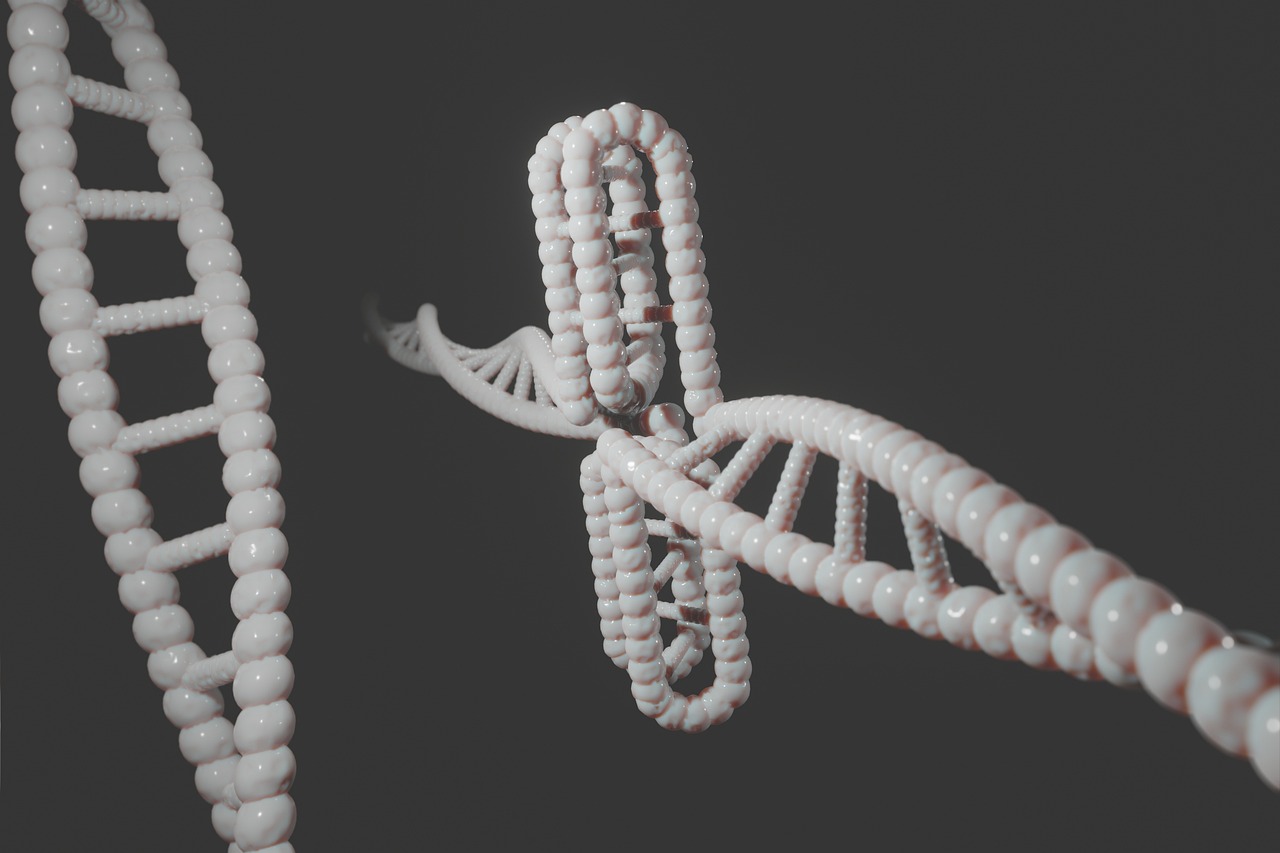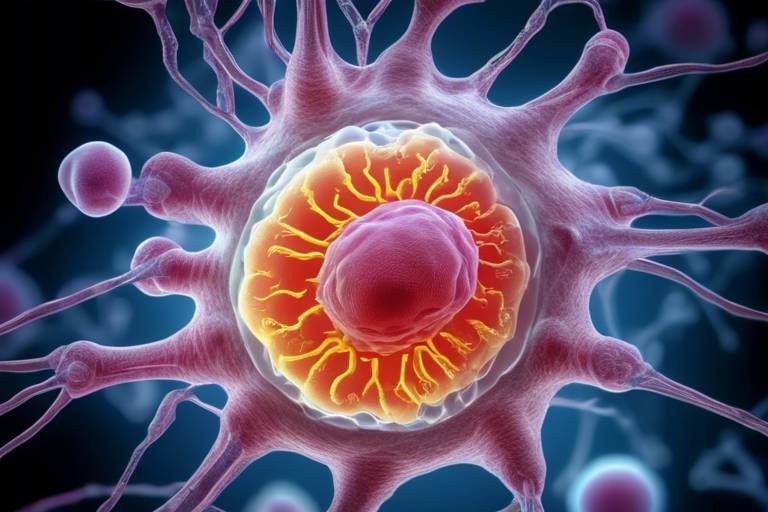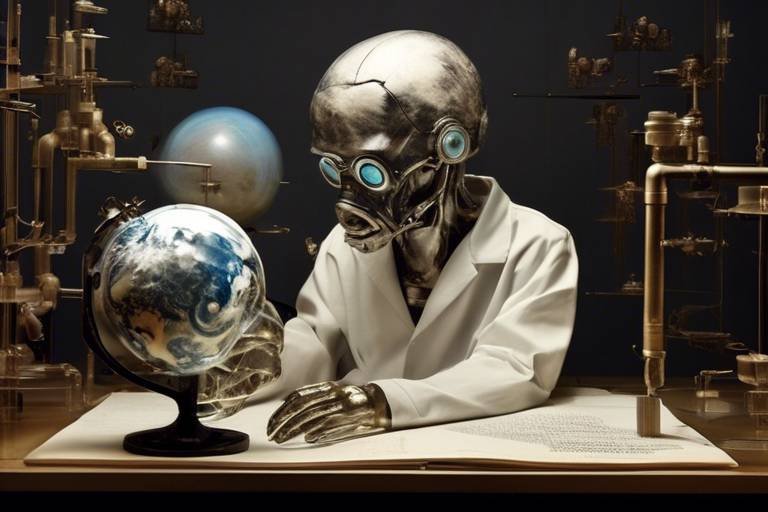Understanding Embryogenesis through the Philosophy of Science
Embryogenesis is a captivating journey that begins with a single fertilized egg, evolving into a fully formed organism. But what if we told you that this intricate process is not just a biological phenomenon? It intertwines with the very fabric of our philosophical understanding of life itself. By exploring embryogenesis through the lens of philosophy, we can uncover layers of meaning that go beyond mere scientific observation. This article invites you to delve into the profound implications that the study of embryonic development holds for our understanding of existence, identity, and morality.
As we embark on this exploration, it’s essential to recognize that the philosophy of science provides us with a framework to interpret the complexities of biological development. It challenges us to ask fundamental questions: What is life? How do we define the boundaries of existence? And what role do our beliefs play in shaping scientific inquiry? The answers to these questions not only enrich our knowledge of embryogenesis but also provoke thought about the ethical and societal implications of manipulating life at its earliest stages.
In the following sections, we will navigate through the stages of embryogenesis, examining how philosophical perspectives such as materialism and idealism influence our understanding of this biological process. We will also tackle ethical considerations that arise from embryonic research, highlighting the importance of consent, autonomy, and societal impacts. By blending science with philosophy, we aim to foster a holistic understanding of embryogenesis that resonates with both the heart and the mind.
So, are you ready to embark on this enlightening journey? Let’s dive deeper into the fascinating world of embryogenesis and the philosophical questions that accompany it.

The Basics of Embryogenesis
Embryogenesis is a fascinating journey that begins with a single fertilized egg, known as a zygote. This tiny cell, which is about the size of a pinhead, embarks on a remarkable transformation, ultimately developing into a fully formed organism. Imagine this process as a complex symphony, where each note represents a specific stage of development, and together they create a harmonious whole. The stages of embryogenesis can be broadly divided into several key phases: cleavage, gastrulation, and organogenesis.
During the cleavage stage, the zygote undergoes a series of rapid cell divisions, resulting in a multicellular structure called a blastula. This phase is akin to a master sculptor chiseling away at a block of marble, gradually revealing the form within. As the cells divide, they also begin to differentiate, meaning they start to take on specific roles and functions. This is where the magic truly begins, as the potential for life unfolds before our eyes.
Next comes gastrulation, a critical phase where the cells reorganize into three distinct layers: the ectoderm, mesoderm, and endoderm. Each of these layers will eventually give rise to different tissues and organs in the body. Think of this stage as the foundational framework of a house; without a solid base, the structure cannot stand. The ectoderm will form the skin and nervous system, the mesoderm will develop into muscles and bones, and the endoderm will create the digestive system and other internal organs.
| Germ Layer | Future Development |
|---|---|
| Ectoderm | Skin and Nervous System |
| Mesoderm | Muscles and Bones |
| Endoderm | Digestive System and Internal Organs |
Finally, we arrive at the phase of organogenesis, where the real magic happens. This is when the organs begin to form and the embryo starts to take on a recognizable shape. It's like watching a painting come to life, with each brushstroke adding detail and depth to the canvas. During this stage, cells communicate with one another through a complex network of signals, ensuring that everything is developing correctly. If all goes well, the embryo will continue to grow and mature until it is ready for birth.
It's important to note that while embryogenesis is a natural and intricate process, it is also influenced by various factors, including genetics and environmental conditions. These factors can either enhance or disrupt the development process, leading to a myriad of outcomes. For instance, certain genetic mutations can lead to congenital disabilities, while environmental toxins may interfere with normal development. This interplay between genetics and environment is a hot topic in both scientific and philosophical discussions.
In conclusion, embryogenesis is not just a biological phenomenon; it is a profound journey that raises questions about life, identity, and the very essence of existence. As we continue to explore this complex process, we also delve into the philosophical implications that shape our understanding of development in the biological sciences. The more we learn about embryogenesis, the more we realize that it is a blend of science, philosophy, and ethics, all intertwined in the tapestry of life.
- What is embryogenesis? Embryogenesis is the process by which a fertilized egg develops into a complex organism, involving multiple stages of cell division and differentiation.
- What are the key stages of embryogenesis? The key stages include cleavage, gastrulation, and organogenesis.
- How do genetics influence embryogenesis? Genetic factors can determine how cells divide and differentiate, impacting the overall development of the embryo.
- What role does the environment play in embryogenesis? Environmental factors can affect the development process, potentially leading to various outcomes, including congenital disabilities.

Philosophical Perspectives on Development
When we dive into the world of embryogenesis, we quickly realize that it's not just a scientific endeavor; it's a philosophical one too. The way we interpret the stages of development and the mechanisms at play can be heavily influenced by our underlying philosophical beliefs. Two dominant frameworks that often emerge in discussions about biological development are materialism and idealism. Each of these perspectives offers unique insights and raises important questions about the nature of life and development.
Materialism posits that everything we observe, including the intricate dance of cells during embryonic development, can be explained through physical processes. In this view, the embryo is seen as a complex machine, with genes and environmental factors working together like cogs in a well-oiled engine. This perspective encourages a scientific inquiry that is rooted in observable phenomena. It suggests that if we can understand the physical laws governing embryogenesis, we can predict and potentially manipulate the outcomes of development. But does this reductionist view overlook the nuances of life? Can we truly capture the essence of development by merely examining the physical components?
Within the materialist framework, the role of genetics cannot be overstated. Genetic information is the blueprint for development, guiding the formation of tissues and organs. However, this raises philosophical questions about genetic determinism. Are we merely products of our genes, or do we possess the ability to influence our development through choices and interactions? This leads us to consider the environmental influences that play a significant role in shaping the developing embryo. Factors such as nutrition, exposure to toxins, and even maternal stress can have profound effects on embryonic outcomes. The interplay between genetics and environment invites us to ponder the age-old debate of nature versus nurture.
On the other hand, idealism offers a contrasting perspective. This philosophical view suggests that ideas, consciousness, and mental constructs shape our reality. From this standpoint, embryogenesis is not just a series of chemical reactions and physical changes; it is also a manifestation of deeper ideas about life and existence. The development of an embryo could be seen as a journey of potentiality, where each stage represents a step toward a greater understanding of what it means to be alive. This perspective encourages us to consider the moral and ethical implications of our scientific pursuits. If we believe that consciousness plays a role in development, how does that change our approach to embryonic research?
In summary, the philosophical perspectives on embryogenesis challenge us to think critically about the nature of life and development. Whether we lean towards materialism or idealism, each framework provides valuable insights that can enhance our understanding of the biological processes at play. As we continue to explore these philosophical implications, we must remain open to the complexities of life and the various influences that shape our existence.
- What is embryogenesis? Embryogenesis is the process by which a fertilized egg develops into a complex organism, involving multiple stages and transformations.
- How does philosophy relate to embryology? Philosophy influences our understanding of embryology by providing frameworks that shape how we interpret biological processes, such as materialism and idealism.
- What role does genetics play in embryogenesis? Genetics serves as the blueprint for development, guiding the formation of tissues and organs while raising questions about genetic determinism.
- What are the ethical implications of embryonic research? Ethical considerations include consent, autonomy, and the societal impacts of manipulating embryos for scientific study.

Materialism in Embryology
When we dive into the realm of embryology, the lens of materialism offers a fascinating perspective. Materialism, at its core, asserts that everything we observe, including the intricate dance of cells during embryonic development, can be explained through physical processes. Imagine a grand symphony where each instrument plays a specific role; in this case, the instruments are the various biological components that come together to create life. This perspective encourages scientists to focus on the tangible, the measurable, and the observable, allowing for a clearer understanding of how organisms develop from a single fertilized egg.
The implications of materialism in embryology are profound. By relying on empirical data and observable phenomena, researchers can dissect the stages of embryogenesis into comprehensible parts. This approach not only aids in identifying the key events during development but also helps in understanding the underlying mechanisms that drive these processes. For instance, the fertilization of an egg, the subsequent division of cells, and the eventual formation of tissues and organs can all be studied through the lens of materialism, revealing the biological clockwork that operates behind the scenes.
However, while materialism provides a robust framework for understanding embryonic development, it also raises interesting philosophical questions. For example, if all aspects of embryogenesis can be explained through physical processes, what role do genetics and environment play in shaping the organism? This leads us to consider the intricate relationship between genetic information and environmental influences, suggesting that while materialism offers a solid foundation, it may not be the complete picture.
In embryology, genetics serves as a crucial player, dictating not just the potential of the organism but also how it interacts with its environment. The interplay here is like a dance between partners, where genetics sets the choreography, but the environment influences the performance. This interaction raises philosophical inquiries about determinism versus free will, challenging the notion that our biological fate is solely dictated by our genes.
Furthermore, the materialistic viewpoint does not only encompass genetics but also the various environmental factors that can affect embryonic development. Think of it as a garden: while the seeds (genetics) determine the type of plants that can grow, the soil, water, and sunlight (environment) ultimately influence how well those plants thrive. This analogy highlights the importance of considering both elements in our understanding of embryogenesis. The dialogue between nature and nurture becomes a critical focal point in this materialistic framework, prompting researchers to explore how external factors can modify genetic expression during development.
In summary, while materialism in embryology offers a structured approach to understanding the complex processes of embryonic development, it also invites us to ponder deeper questions about the roles of genetics and environment. The beauty of this perspective lies in its ability to dissect and analyze, yet it also serves as a reminder that life is not merely a series of physical processes but a rich tapestry woven from both biological and environmental threads.
- What is materialism in the context of embryology? Materialism in embryology refers to the idea that all phenomena, including embryonic development, can be explained through physical processes and empirical data.
- How does genetics influence embryogenesis? Genetics provides the blueprint for development, determining the potential traits and characteristics of the organism.
- What role do environmental factors play in embryonic development? Environmental factors interact with genetic information, influencing how genes are expressed and how the organism develops.
- Are there philosophical implications of materialism in embryology? Yes, materialism raises questions about determinism and the extent to which our biology is influenced by genetics versus environmental factors.

The Role of Genetics
Genetics serves as the blueprint for **embryogenesis**, guiding the intricate dance of cellular division and specialization that transforms a single fertilized egg into a fully formed organism. At the heart of this process lies DNA, the molecule that encodes the instructions necessary for development. Imagine DNA as a grand symphony, where each gene plays its part to create a harmonious outcome. This symphony is not only vital for the development of physical traits but also influences the timing and coordination of various developmental stages. The interplay between genes and the environment can be likened to a skilled conductor leading an orchestra, ensuring that every note is played at the right moment to achieve a beautiful performance.
Genetic factors can be categorized into two main types: **dominant** and **recessive** genes. Dominant genes can overshadow the effects of recessive ones, leading to observable traits in the offspring. For instance, if a dominant gene for brown eyes is present, it will typically manifest regardless of the recessive gene for blue eyes. This genetic interaction raises philosophical questions about **determinism**—to what extent are our traits preordained by our genetic makeup? Are we merely products of our genes, or do we have the power to influence our development through choices and experiences?
Moreover, the role of genetics in embryogenesis isn't just about the genes themselves; it's also about how they interact with environmental factors. This relationship can be illustrated through the **nature versus nurture** debate, where genetics represents 'nature' and environmental influences represent 'nurture.' For example, a genetically predisposed embryo might develop differently if exposed to certain environmental conditions, such as temperature fluctuations or nutrient availability. This complex interplay can lead to variations in development, prompting scientists and philosophers alike to ponder the implications of genetic determinism versus environmental influence.
To further illustrate the impact of genetics on embryonic development, consider the following table, which summarizes key genetic factors and their roles:
| Genetic Factor | Role in Development |
|---|---|
| Dominant Genes | Expressed in the presence of one or more copies; often dictates key traits. |
| Recessive Genes | Expressed only when two copies are present; can be masked by dominant genes. |
| Mutations | Changes in DNA that can lead to variations in development; may have beneficial or harmful effects. |
| Epigenetics | Changes in gene expression that do not involve alterations to the DNA sequence; influenced by environmental factors. |
In conclusion, genetics plays a pivotal role in embryogenesis, serving as both a guide and a determinant of how an organism develops. As we delve deeper into the **mysteries of the genome**, we uncover not just the mechanics of development but also a wealth of philosophical questions about our existence and the nature of life itself. The exploration of genetics in embryology is not merely a scientific endeavor; it is a journey into understanding what it means to be alive.
- What is the primary function of genetics in embryogenesis? Genetics provides the instructions necessary for the development and differentiation of cells in an embryo.
- How do environmental factors influence genetic expression? Environmental factors can affect how genes are expressed, leading to variations in development, a concept known as epigenetics.
- What is the nature versus nurture debate? This debate centers around the relative contributions of genetics (nature) and environment (nurture) to human development and behavior.

Environmental Influences
When we think about embryogenesis, it's easy to get lost in the fascinating world of genetics and cellular mechanisms. However, what often gets overshadowed is the significant role that environmental factors play in shaping an embryo's development. Just like a seed needs the right soil, sunlight, and water to grow into a healthy plant, an embryo requires a suitable environment to flourish. This environment encompasses a broad range of influences, including nutritional availability, exposure to toxins, and even maternal health.
To illustrate this point, consider the concept of nature versus nurture. While genetics lays the groundwork for development, environmental factors can either enhance or hinder that potential. For instance, a mother’s diet during pregnancy can profoundly affect the embryo's growth and health. Studies have shown that deficiencies in essential nutrients, such as folic acid, can lead to serious developmental issues like neural tube defects. This raises the question: how much control do we really have over our biological destiny?
Moreover, the impact of environmental toxins cannot be overstated. Exposure to harmful substances, such as pesticides or heavy metals, can disrupt normal embryonic development. The intricate dance of cellular signaling can be thrown off course, leading to a cascade of developmental abnormalities. The implications of these findings are profound, not just for individual health, but also for public health policies aimed at protecting vulnerable populations.
Another fascinating aspect of environmental influences is the phenomenon known as epigenetics. This field studies how environmental factors can cause changes in gene expression without altering the underlying DNA sequence. Imagine a light switch that can be turned on or off based on external stimuli. This is similar to how epigenetic mechanisms work, allowing for a dynamic response to environmental changes. For example, stressors like pollution or inadequate maternal care can lead to epigenetic modifications that affect not just the embryo, but potentially future generations.
In summary, while genetics provides the blueprint for development, the environment serves as the architect, shaping and molding the final outcome. Understanding this interplay is crucial for advancing our knowledge of embryogenesis and improving health outcomes. As we delve deeper into the complexities of this relationship, we must also consider the ethical implications of manipulating these environmental factors. After all, with great power comes great responsibility.
- How do environmental factors affect embryonic development?
Environmental factors, such as nutrition and exposure to toxins, can significantly influence the growth and health of an embryo, potentially leading to developmental abnormalities. - What is epigenetics?
Epigenetics is the study of how environmental factors can cause changes in gene expression without altering the DNA sequence itself, affecting development and health. - Why is maternal health important during pregnancy?
Maternal health is crucial because it directly impacts the nutrients and environment provided to the developing embryo, influencing its growth and development. - Can environmental influences affect future generations?
Yes, epigenetic changes caused by environmental factors can potentially be passed down to future generations, impacting their health and development.

Idealism and Its Implications
When we think about idealism, we often picture a world shaped not just by the tangible, but by the ideas and consciousness that underpin our reality. This philosophical perspective suggests that the mind plays a pivotal role in shaping the physical world, including the intricate processes of embryogenesis. So, how does this notion affect our understanding of biological development? Idealism invites us to consider that the developmental processes of embryos are not merely a series of chemical reactions and genetic instructions but are also influenced by the ideas and beliefs we hold about life and existence.
For instance, the way we view the purpose of life and the essence of consciousness can dramatically influence our research and ethical considerations in embryology. If we subscribe to an idealistic framework, we might argue that the potential of an embryo extends beyond its genetic makeup. This perspective opens up a dialogue about the value of life and the moral status of embryos. Are they merely clusters of cells, or do they hold the potential for consciousness and experience? This question is pivotal in shaping our research ethics and societal norms.
Moreover, idealism encourages a holistic view of development. It posits that to fully understand embryogenesis, we should consider not just the biological factors but also the cultural and philosophical contexts in which development occurs. This could lead to a more comprehensive understanding of how various factors, such as parental beliefs and societal values, influence the developmental environment of an embryo. In this sense, idealism can bridge the gap between the scientific and the philosophical, providing a richer narrative about how life unfolds.
To illustrate the implications of idealism in embryogenesis, consider the following table that compares materialism and idealism in the context of embryonic development:
| Aspect | Materialism | Idealism |
|---|---|---|
| Definition | Focuses on physical processes and genetic factors. | Emphasizes the role of ideas and consciousness. |
| View of Embryos | Clusters of cells guided by genetic instructions. | Potential beings with inherent value and consciousness. |
| Research Implications | Encourages a strictly scientific approach. | Promotes ethical considerations and societal impacts. |
| Developmental Influences | Genetics and environment. | Cultural beliefs and philosophical views. |
In conclusion, the implications of idealism in embryogenesis challenge us to rethink our approach to biological development. By acknowledging the influence of consciousness and ideas, we can foster a more nuanced understanding of life itself. As we delve deeper into the mysteries of embryogenesis, it becomes increasingly clear that our beliefs and values significantly shape the way we interpret biological phenomena. This interplay between philosophy and science not only enhances our understanding but also guides the ethical frameworks we must navigate in the realm of embryonic research.
- What is idealism in the context of embryogenesis?
Idealism suggests that ideas and consciousness play a crucial role in shaping our understanding of embryonic development, influencing how we perceive the potential and value of embryos. - How does idealism differ from materialism?
While materialism focuses on physical processes and genetic factors, idealism emphasizes the importance of ideas, beliefs, and consciousness in shaping reality. - What are the ethical implications of idealism in embryonic research?
Idealism raises questions about the moral status of embryos, encouraging researchers to consider the broader societal and philosophical impacts of their work.

Ethical Considerations in Embryonic Research
When diving into the realm of embryogenesis, one cannot ignore the ethical considerations that arise, particularly in the context of embryonic research. The ability to manipulate embryos for scientific purposes opens a Pandora's box of moral dilemmas that society must grapple with. As we stand on the brink of groundbreaking discoveries, we must ask ourselves: at what cost do we pursue knowledge? The implications of our actions can ripple through generations, affecting not just science but the very fabric of our societal norms.
One of the most pressing ethical concerns is the concept of consent and autonomy. In many cases, embryos are created through in vitro fertilization (IVF) processes, where multiple embryos are often produced. The question arises: who has the right to decide what happens to these embryos? Should they be used solely for research, discarded, or preserved for potential future life? The debate intensifies when we consider the potential for genetic manipulation and the creation of genetically modified organisms. This leads to a broader discussion about the rights of the unborn and the moral responsibilities of those conducting research.
Moreover, the societal implications of embryonic research are profound. As advancements in our understanding of embryogenesis continue to evolve, public policy must adapt accordingly. For instance, consider the following points:
- How will new technologies, such as gene editing, be regulated?
- What are the potential consequences of creating "designer babies"?
- How do we balance scientific progress with ethical considerations?
These questions highlight the delicate dance between innovation and responsibility. As we navigate these uncharted waters, it is crucial for scientists, ethicists, and policymakers to engage in open dialogue. This ensures that the pursuit of knowledge does not overshadow the moral implications of our actions. For instance, the societal perception of embryonic research can significantly influence funding, legislation, and public acceptance of scientific advancements.
Furthermore, the ethical landscape is further complicated by cultural and religious beliefs surrounding the sanctity of life. Different societies have varying views on when life begins, which can lead to conflicting opinions on the permissibility of embryonic research. In some cultures, embryos are viewed as potential life deserving of rights, while others may prioritize the potential benefits of research. This divergence underscores the need for a comprehensive approach that respects diverse perspectives while fostering scientific inquiry.
Ultimately, the ethical considerations surrounding embryonic research are not just academic; they are deeply personal. They challenge us to reflect on our values and the kind of future we envision. As we continue to explore the mysteries of embryogenesis, let us strive to ensure that our quest for knowledge is grounded in compassion and ethics. The path forward must be paved with careful consideration of the consequences of our actions, ensuring that we honor the delicate balance between scientific advancement and moral responsibility.
What is embryonic research?
Embryonic research involves studying embryos to understand developmental processes, often with the aim of advancing medical science.
Why is consent important in embryonic research?
Consent is crucial because it respects the rights and autonomy of individuals involved in the creation and use of embryos.
What are the societal impacts of embryonic research?
The societal impacts can include changes in public policy, ethical norms, and cultural attitudes towards reproduction and genetic manipulation.

Consent and Autonomy
When we dive into the murky waters of embryonic research, one of the first things that come to mind is the concept of consent. In the realm of science, especially when it involves embryos, the question of who gets to say "yes" or "no" becomes crucial. Imagine, for a moment, that you are faced with a decision that could alter the course of life itself. This is the reality researchers confront when they seek to use human embryos in their studies. It’s not just about scientific advancement; it’s about respecting the autonomy of individuals and the ethical implications that arise from such decisions.
Consent in embryonic research is not merely a formality; it embodies the very essence of ethical responsibility. Researchers must obtain informed consent from donors, which involves providing clear information about the purpose of the research, potential risks, and the implications of their participation. Here, transparency is key. Participants should feel empowered to make choices that align with their values and beliefs. But how do we ensure that consent is truly informed? It’s a complex issue that raises questions about the adequacy of information provided and the ability of individuals to comprehend the nuances of embryonic research.
Moreover, the concept of autonomy extends beyond just the individuals donating embryos. It encompasses broader societal considerations, particularly regarding vulnerable populations. For instance, how do we protect those who may not fully understand the implications of their consent due to cultural, educational, or socioeconomic factors? This is where ethical frameworks come into play, guiding researchers to navigate these treacherous waters responsibly.
To better understand the implications of consent and autonomy in embryonic research, consider the following table that outlines key factors:
| Factor | Description |
|---|---|
| Informed Consent | Participants must be fully aware of the research purpose, risks, and benefits. |
| Voluntary Participation | Individuals should feel free to choose without coercion or undue influence. |
| Respect for Persons | Recognizing the dignity and autonomy of all individuals involved. |
| Vulnerability Considerations | Extra protections for individuals who may be at risk of exploitation. |
As we continue to explore the ethical landscape of embryonic research, it’s essential to acknowledge that the conversation around consent and autonomy is ongoing. Researchers, ethicists, and society must engage in a dialogue that respects individual rights while advancing scientific knowledge. It’s a delicate balancing act, much like walking a tightrope, where one misstep could lead to ethical breaches that undermine public trust in scientific inquiry.
In conclusion, the issues of consent and autonomy in embryonic research are not just academic discussions; they have real-world implications that affect individuals and society as a whole. By prioritizing ethical considerations, we can ensure that scientific progress does not come at the expense of human dignity and rights.
- What is informed consent in embryonic research? Informed consent refers to the process by which researchers provide potential participants with comprehensive information about the study, allowing them to make an educated decision about their involvement.
- Why is autonomy important in scientific research? Autonomy is crucial because it respects individuals' rights to make choices about their own bodies and contributions to research, ensuring that they are not coerced or manipulated.
- How do researchers ensure that consent is informed? Researchers must communicate clearly and transparently about the research goals, potential risks, and the implications of participation, often using layman's terms to ensure understanding.
- What ethical frameworks guide consent in embryonic research? Ethical frameworks often include principles like respect for persons, beneficence, and justice, helping researchers navigate complex moral dilemmas.

Societal Impacts
When we dive into the fascinating world of embryogenesis, we can't ignore the that arise from our growing understanding of this complex process. The advancements in embryological research not only reshape our scientific knowledge but also ripple through the fabric of society, influencing everything from public policy to ethical standards. Imagine a world where the mysteries of life are unraveled, leading to groundbreaking treatments for infertility or genetic disorders. However, with great power comes great responsibility, and this is where the societal implications become crucial.
As we explore these impacts, we must consider how advancements in embryogenesis can lead to significant changes in societal norms and values. For instance, as more people become aware of the potential for genetic manipulation, questions arise about what it means to be human. Are we venturing into a territory where we can 'design' our children? This notion can lead to a societal divide, where those with access to genetic enhancements may gain advantages over those without. The concept of genetic equity thus becomes a pressing issue, raising questions about fairness and accessibility in a world where science can dictate life outcomes.
Moreover, the ethical implications of embryonic research can provoke heated debates within communities. Take, for instance, the discussion surrounding the use of embryos for research purposes. While some argue that this research can lead to life-saving treatments, others see it as a violation of moral and ethical boundaries. This conflict can create a societal schism, where differing beliefs about the sanctity of life clash with the pursuit of scientific knowledge. As such, public policy must navigate these turbulent waters carefully, aiming to balance innovation with ethical considerations.
Furthermore, the societal impacts of embryogenesis extend to educational institutions. As we teach future generations about the intricacies of life, we must also equip them with the tools to engage in these ethical discussions. This means fostering a culture of critical thinking around science and ethics, encouraging students to ponder questions like:
- What are the limits of scientific intervention in natural processes?
- How do we ensure that scientific advancements benefit all of society?
- What role should public opinion play in shaping scientific research?
In conclusion, the exploration of embryogenesis is not just a scientific endeavor; it is a profound journey that intersects with our societal values and ethical frameworks. As we continue to unlock the secrets of life, we must remain vigilant about the implications of our discoveries, ensuring that science serves to uplift humanity rather than divide it. The dialogue surrounding these issues is essential, as it shapes the future of not just scientific inquiry, but also the very essence of what it means to be human in an ever-evolving world.
- What is embryogenesis? Embryogenesis is the process by which a fertilized egg develops into a complex organism through various stages of development.
- How does embryogenesis impact society? The advancements in embryogenesis can influence public policy, ethical standards, and societal norms, particularly regarding genetic manipulation and research ethics.
- What ethical issues arise from embryonic research? Ethical issues include consent and autonomy regarding the use of embryos, as well as debates about the moral implications of genetic manipulation.
- How can education address the societal impacts of embryogenesis? Education can foster critical thinking and ethical discussions around the implications of scientific advancements in embryology.
Frequently Asked Questions
-
What is embryogenesis?
Embryogenesis is the incredible journey where a single fertilized egg transforms into a complex organism. It involves a series of stages that include cell division, differentiation, and morphogenesis, ultimately leading to the formation of tissues and organs.
-
How do philosophical perspectives influence our understanding of embryogenesis?
Philosophical frameworks, like materialism and idealism, shape how we interpret biological processes. Materialism focuses on physical processes and genetics, while idealism emphasizes the role of consciousness and ideas in shaping development. Each perspective offers unique insights into the complexities of embryonic growth.
-
What role does genetics play in embryonic development?
Genetics is a key player in embryogenesis, dictating how cells differentiate and develop into various tissues. Genetic factors can determine physical traits and influence how organisms respond to environmental stimuli, raising intriguing questions about genetic determinism and the balance of nature versus nurture.
-
How do environmental factors affect embryonic development?
Environmental influences, such as nutrition, toxins, and even temperature, can significantly impact embryonic growth. This interplay between genetics and the environment raises philosophical questions about how much control we truly have over our biological development.
-
What ethical considerations arise in embryonic research?
Embryonic research brings forth important ethical questions, especially regarding consent and the autonomy of using embryos in studies. Researchers must navigate these moral dilemmas while considering the potential benefits of advancing scientific knowledge.
-
How can advancements in embryogenesis research affect society?
Understanding embryogenesis can have profound societal impacts, influencing public policy, healthcare practices, and societal norms. As we learn more about the developmental processes, it can lead to new treatments and ethical discussions about the implications of manipulating life at its earliest stages.



















